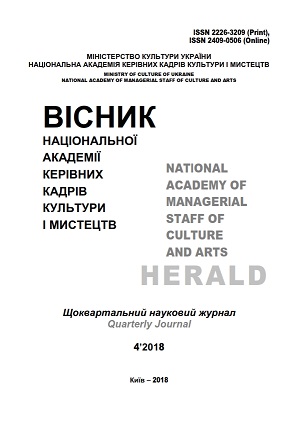Формування сучасної вокальної культури України
Formation of Modern Vocal Culture of Ukraine
Author(s): Limin WeiSubject(s): Music, Culture and social structure , Higher Education , Sociology of Culture, Sociology of Art
Published by: Національна академія керівних кадрів культури і мистецтв
Keywords: vocal culture; vocal performance; space of musical art; academic singing; non-academic singing;
Summary/Abstract: The purpose of the article is to show the formation process and the sociocultural significance of the modern vocal culture within which the vocal art develops. The methodology is based on the concepts and theoretical conclusions in the field of aesthetics, philosophy of art, musical pedagogy, cultural studies and art history. The scientific novelty of the article is a look at academic and non-academic singing not only as types of vocal art, differing in the level and quality of performance, but also as different cultural traditions, which are largely due to the specific perception of different target audiences. Conclusions. Gradually, with the development of social relations, national vocal cultures are merging into a single pan-European (and due to modern globalization processes into a global) vocal culture. Vocal culture, which has developed and stood out as a kind of phenomenon, has taken its place in the general culture, and today plays a significant social role in society. So, there is an association of composers, performers, connoisseurs of music and vocal performance in a special musical community which, on the one hand, is determined by features of national originality, and on the other - corresponds to European and world trends in the development of art. An important role in the formation of the space of vocal culture of the XX - XXI centuries is played by the public - the recipient of musical art. Like the division of the whole culture into mass and elite, vocal is also divided into popular, understandable for wide circles of society (often called pop, commercial, mass) and elite (in turn, usually associated with academic music). So, they differ, in a certain way oppose, oppose, not only academic and pop manners of vocal performance, but also academic and pop vocal cultures, which, of course, affects the attitude to traditions, to the technique of vocation, to culture in general, talent and creativity.
Journal: Вісник Національної академії керівних кадрів культури і мистецтв
- Issue Year: 2018
- Issue No: 4
- Page Range: 251-255
- Page Count: 5
- Language: Ukrainian

